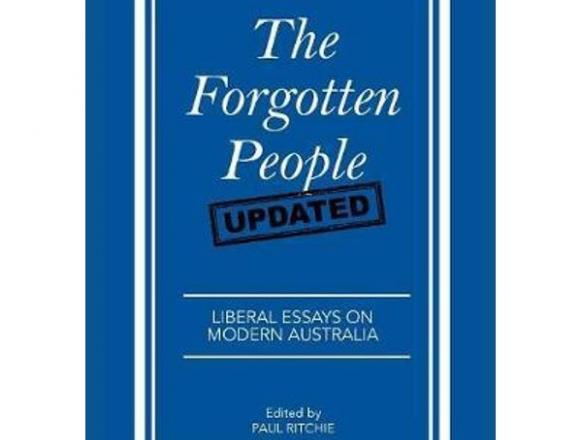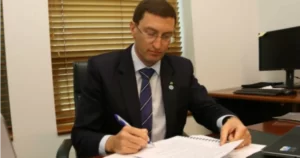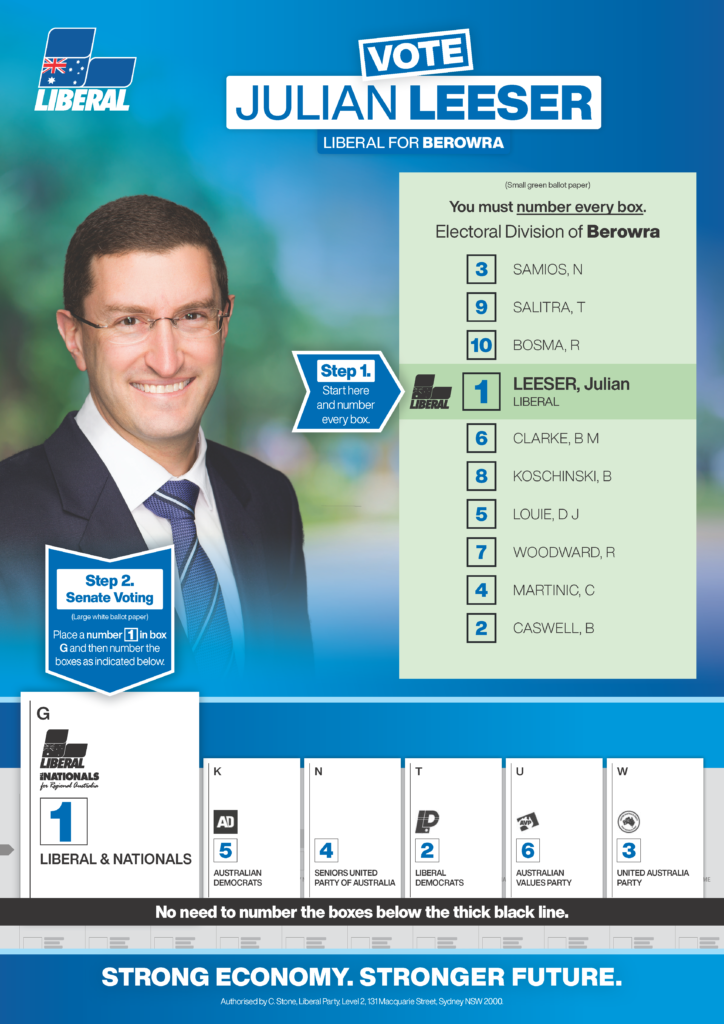“FREEDOM OF WORSHIP”
BY JULIAN LEESER
Originally published in The Forgotten People Updated.
I write this as I watch my first-born child sleep peacefully in his hospital crib.
James Samuel John Leeser was born at the Sydney Adventist Hospital, whose staff are called to care in the Christian Adventist tradition and take their Sabbath seriously.
James bears the name of his grandfather and two of his great grandfathers; and he carries Joanna’s and my greatest hopes.
We have given him names of his forebears not just because, according to tradition, we honour our parents and grandparents but because we want him to know that his story does not just start with him, or with us, but that he is a link in a chain to a family, a society and a set of values and traditions.
To any parent their child is precious. Jo and I want for James the same thing that other parents want for their children. To have a long, happy, healthy and fulfilling life full of meaning and opportunity and free of any discrimination that would prevent him from achieving the full development of his gifts and talents.
James is a seventh generation Australian. He is inheriting a country from his parents who have inherited from their parents and so on across the generations.
I want James to understand what is uniquely good about this land and to understand his duty to preserve the inheritance he has had from his parents as I have from mine.
I also want James to understand the particular perspective that comes from being a Jewish Australian – a religious minority which has never numbered more than one percent of the population – in a land which has been, almost uniquely in human history, good to the Jewish people.
Across those seven generations some parts of my family came to try their luck in a new land while other parts of the family came to escape religious persecution, from the pogroms and the Holocaust to the security of Australia.
With each generation, that faith ebbed and flowed, as different ancestors reflected on what it meant to be Jewish in their times. Some were religious, some less so and that choice will be before James as it was before them. Just like James’ own parents, his ancestors weren’t perfect, but as I have discovered, their journeys and their faith can give strength to face life’s tests and trials.
Australia is founded on the Judeo-Christian tradition, the font of liberalism, which has two notions at its core. First, that life is a sacred gift from God and second, that all human beings are created in the image and likeness of God and that therefore all human beings, whoever we are, are deserving of equal dignity. The sanctity of life and the dignity of the human person form the touchstone of liberalism’s focus on the individual over the collective and the importance of preserving life as a national policy goal.
If all human beings are in the image and likeness of God then all human beings should have freedom to worship God in their own way. This notion has underpinned much Western theological thinking since the Westphalian settlement and has had a particular resonance in the post war era through such statements as Nostra Aetate – the Vatican’s declaration on relations with other faiths.
One of the things that makes me proud of Australia is that it has always been a religiously tolerant land where people can freely practice their faith.
The measure of a truly free society is how it treats its minorities. Does it grant them full citizenship rights or does it provide for discriminatory laws?
In his own day Menzies was always as concerned about minority rights as he was for the rights of the majority, Menzies said that “although the essence of democracy is that the majority shall rule, democracy can never be the real instrument of freedom unless its majorities are constantly tender for the rights of their minorities.”
For people of faith, their particular faith is fundamental to who they are and how they see the world. For people of faith the idea that a tradition or a set of beliefs is ordained by God (or whatever Supreme Being they might believe in) makes that tradition or set of beliefs fundamental.
Therefore the right to practice your faith according to its traditions, customs and beliefs is fundamental to a believer’s very existence. That is why true believers seek to leave countries where people are not able to freely exercise their religious beliefs or worse still are persecuted for doing so.
Australia has never been that sort of a country.
Throughout history in Europe, Africa and the Middle East, Jews have been persecuted for their faith – forced to convert, forced to deny their beliefs, or forced to renounce God. They have been murdered because their religious beliefs, practices and laws were different to the majority.
But in Australia Jews have always been able to be that which they are called upon to be, a light unto the nations, to perform the mitzvot or good deeds according to the Law of Moses.
In Jeremiah we are told to “pray for the peace of the city for if it prospers so to shall you prosper”.
And so into the bargain of being able to practise their faith freely Jews have contributed to Australia vastly beyond their tiny numbers.
Jews have been a part of the Australian story since a dozen Jewish convicts came ashore with the First Fleet.
Jews have had the freedom to practice their faith almost right from the get-go.
No office has ever been barred to Jews in Australia.
This is the country of Sir John Monash and Sir Isaac Isaacs.
And four years before Jews were admitted to the British Parliament, Sir Saul Samuel was elected to the NSW Legislative Council in 1854. In 1860 he became possibly the first Jew in the British Empire to become a minister of the Crown.
In colonial times Vabien Solomon was premier of South Australia and with Isaacs and Elias Solomon the three were members of the first Commonwealth Parliament. Today it is with some considerable personal pride that I am one of six Jewish members of the Commonwealth Parliament.
But as an Australian James will meet many people of different faiths and will have the opportunity to experience and gain an understanding of the customs and ceremonies of faith communities which are not his own.
James was born into a society which is predominantly Christian with a full range of Eastern and Western Churches – Catholic and Protestant, Pentecostal and Orthodox.
He will also have the chance to meet Australians who make up the 10 percent of our population who adhere to non-Christian religions.
From European settlement until 1981 Judaism was the major non-Christian denomination in Australia. But since that time, the number of Muslims, Buddhists, Hindus and Sikhs has overtaken the number of Jews in this country.
The religious diversity of Australia means that Australians from every faith background have the chance to share their traditions with others.
This is no threatening thing.
For those people who are comfortable in their own faith tradition, engaging with other traditions can be a way of strengthening belief and understanding of one’s own tradition.
That was always the view in the home where I grew up.
My parents chose to send me to an Anglican school because they wanted me to be part of the mainstream of society and to understand Australia’s dominant Christian tradition, its theology, its beliefs and its culture.
But they also instilled in me a sense that while we should respect Christianity, our faith was different.
This was instilled in me when unlike my class mates, on Friday night I was at home for Shabbat dinners. We attended synagogue on a Friday night and Saturday, not a Sunday. And every week I would attend classes in Hebrew and Jewish studies to prepare me for my bar mitzvah.
These were not things most of my other class mates had to do.
But having my own faith tradition that was different from the other boys was not a negative, it was a positive. I understood their tradition and could tell them something of mine.
Engaging with people of different faiths continued beyond my school days.
Years later prior to entering the Parliament, I spent the best four years of my working life at Australian Catholic University where I not only spent time thinking about education policy but about the future of the Church in Australia and its place in our national life.
I also had the privilege of serving on the board of Mercy Health – a large Catholic Health organisation run by the Sisters of Mercy. When I was asked to serve on the Board by their Executive Chairman Julien O’Connell, I had to tell Julien that I was not a Catholic but a Jew just in case being of the Catholic faith was a precondition for serving on the board. Julien paused and said. “That’s funny I think we had a Jewish bloke involved in the organization once, you might have heard of him his name was Jesus Christ!” That was typical of Julien’s humour, but it is also typical of the openness of the Australian Catholic Church.
While Catholicism is not my faith tradition, in order to support the mission of the University I would often attend Mass celebrated by the university chaplain Fr Anthony Casamento csma.
There is something beautiful about sitting quietly and watching people of deep faith observe the rituals and hearing the biblical readings, some from my own bible and some from the New Testament, and reflecting on what that wisdom means for each of us. Rituals of this sort provide clarity and calm in what can often be a chaotic world. Today as Parliamentarian I regularly attend Church services as well as services at Hindu temples, Buddhist temples, Gurudwarrras, Bahai Temples and Mosques.
My best friend Shahan Ahmed and I were at high school and law school together. Our friendship is born of our shared experience. Shahan is a Muslim. His father Salah is a distinguished legal academic who taught contract law to a generation of students at UNSW. He is also an expert in Islamic law. Shahan’s grandfather had been the first Attorney General of Bangladesh. Shahan now follows the family tradition and has built a successful practice at the NSW Bar. Shahan has shared Passover with us and we have shared Eid with him. I have learnt something of Islam from him and he has learnt something of Judaism from me. These are the bonds that make Australia stronger.
It says something good about Australia that a Jewish boy could be educated by Anglicans, work for the largest mission of the Catholic Church and have a best friend who is a Muslim.
That is not to say people of faith have always got along in Australia.
Until the early 1970s there was a sectarian divide between Protestants and Catholics. It was a divide that was so distinct that when Jim Spigelman the future Chief Justice of NSW joined Australia’s other major political party he was asked “are you a protestant or a Catholic?,” to which he replied “I am a Jew”. His interlocutor continued: “Yes, but are you a protestant Jew or a Catholic Jew?”
It says something about Menzies – in fact it defines Menzies as a liberal in my view – that he never bought into the sectarian debate although there would have been plenty of votes in doing so. Menzies could boast that “I had never lent myself to any bitter disputes between people on the basis of their religion”.
Menzies was a proud Presbyterian Scot but he actively rejected sectarianism. Menzies went further and became the first national political leader to provide financial assistance to the Catholic school system. In fact, he was so concerned to create equality of educational opportunity regardless of the religious tradition of the school that he told an audience in 1964 “…there are those who say, ‘you can’t fail to discriminate between Protestant and Catholic schools’. And the answer is that if I had to do that I would not want to be in public life.”
Today while more than two thirds of Australians register themselves as adherents to one or other faith, the number of Australians with any sort of religious literacy is declining.
The public conversation about religion is not assisted by simplifications of religious doctrines and the assumption by some in the media that religious leaders are either paedophiles, terrorists or obsessed with some else’s sex life.
It is rare that religion is lauded for its works of education, healthcare or social welfare. It is even rarer that religion is lauded for providing people a sense of meaning, community and an inspiration to do good works in this world based on a set of teachings that restrain the selfish instincts of human beings.
Instead religion is being delegitimised by those who believe that it is based on superstitions not science, and at worst, pits competing minorities against each other and calls for protections to be able to discriminate against people who are not part of ‘the club’.
True, some of our religious institutions have suffered from poor leadership and moral corruption and, as a newer generation of leaders has arisen, they are not always quick to see that religion is operating in a more hostile public environment than it has at any time in our history.
Unlike in times gone by today it is a rare politician or journalist who will profess their faith in public and /or quote from the Bible.
Christianity which has been the dominant religion in Australia since European Settlement had been more under attack than other faiths and sometimes Christian religious practices and preferences are subjected to challenges in the Courts.
The population seems to be unsympathetic to providing protections for religious freedom where that means that the practice for which protection is sought is out of step with the age or seeks to discriminate against others. And yet to people of faith these beliefs and actions are fundamental to their conception of themselves.
But despite attempts by some opinion leaders to marginalise the place of religion in the public sphere, somehow religion survives as a force that changes people’s lives for the better, calling them to love God and serve their fellow citizens.
I believe that the survival of religion in Australia is a fundamentally good thing and the right to practise or not to practise a faith of one’s own choosing is fundamental to a free society.
Menzies remarked that religion constantly reminds Australians that:
“… however clever he may be he is not his own maker, however self-confident he may think he is, he is living in a world not created by him, that he has responsibilities, that he has great inheritances, that he is responsible in his own proper fashion for the people who come after him… a background of faith, a background of humility… must be the inevitable products of religious belief.”
As Lord Jonathan Sacks, the former Chief Rabbi of the Commonwealth, reminds us:
“Religion survives because it answers three questions that every reflective person must ask. Who am I? Why am I here? How then shall I live? We will always ask those three questions because homo sapiens is the meaning-seeking animal, and religion has always been our greatest heritage of meaning…We stand to lose a great deal if we lose religious faith. We will lose our Western sense of human dignity. I think we will lose our Western sense of a free society. I think we will lose our understanding of moral responsibility. I think we will lose the concept of a sacred relationship, particularly that of marriage, and we will lose our concept of a meaningful life. I think that religious belief is fundamental to Western civilisation and we will lose the very heart of it if we lose our faith…
I once defined faith as the redemption of solitude. It sanctifies relationships, builds communities, and turns our gaze outward from self to other, giving emotional resonance to altruism and energizing the better angels of our nature. These are some of the gifts of our encounter with transcendence, and whether it is love of humanity that leads to the love of God or the other way round, it remains the necessary gravitational force that keeps us, each, from spinning off into independent orbits, binding us instead into the myriad forms of collective beatitude.
A society without faith is like one without art, music, beauty or grace, and no society without faith can endure for long.”
I believe religion has a particular role to play in the world. It calls people to serve others, providing a sense of identity and a purpose to life that is larger and more enduring than fulfilling the needs of the material self. It brings people together from different backgrounds and builds a sense of community. The search for meaning in people’s lives has never been stronger than it is today. We see it in the rise of youth suicides, we see it in the rise of secular substitutes for faith communities, we see it in the disaffection of young people and in some segments of society the attraction of a nihilistic brand of radical Islam. In this context strong, welcoming, confident, faith communities have an important voice that needs to be heard more in the public square.
Working in concert together they can bolster the case for freedom of religion and bolster the social fabric of our country.




